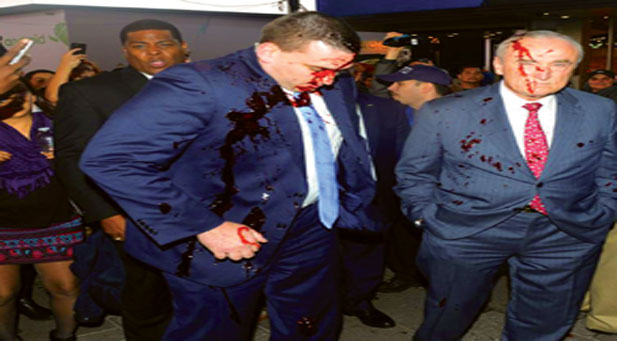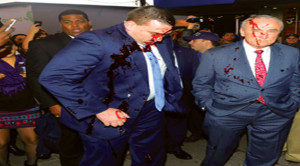
 NYPD reaches out: Launches new community policing strategy in city to build trust
NYPD reaches out: Launches new community policing strategy in city to build trust
New York City Police Commissioner William Bratton (r) is seen after having fake blood thrown on him during demonstrations in Times Square. (Photo by Ken Murray/New York Daily News
By Tony Best, Special to the NNPA from the New York Carib News
As New York City’s police chief William Bratton launches his new community policing strategy designed to boost relationships with neighborhoods, the NYPD’s top brass is reaching out to the Caribbean community for support and feedback about an initiative that aims to build trust in the force.
And an initial meeting arranged by Bratton and some of his top commanders and attended by Caribbean community leaders, including New York State Assemblyman Nick Perry, an assistant Speaker Pro-Tem of the lower chamber of the legislature in Albany; Dr. Roy Hastick, President of the Caribbean-American Chamber of Commerce and Industry; Rickford Burke, head of the Caribbean-Guyana Institute for Democracy; Curtis Nelson, executive Director of Sesame Flyers; and Jumaane Williams and Dr. Mathieu Eugene, two Brooklyn City Council members was described later as “informative” and a “good first step.”
“It was useful and it provided an opportunity for people to dialogue with the chief of police and to raise some of their concerns,” said Perry, a long-serving lawmaker in Albany.
Dr. Hastick described the meeting’s outcome in a similar way.
“It was cordial and seeks to achieve an essential goal: better relations between the NYPD and various communities across the City,” said the CACCI leader. “It’s a good first step and we look forward to a continuing dialogue.”
Interestingly, the session and additional meetings may lead to a forging of business ties between the NYPD and minority and women-owned enterprises in the five boroughs.
“We in the chamber are interested in the growth of small businesses, not only for enterprises owned by people from the Caribbean but across the board,” said Hastick, the chamber’s founder. “We envisage a meeting that would focus on small businesses and their needs.”
The session follows the launching of Bratton’s new approach to community policing that’s being labelled “One City: Safe and Fair Everywhere.” It calls for more officers on the beat to heighten people’s feelings of safety on the streets and in their homes and improve relationships between neighborhoods and officers.
“As important as safety is, it is not enough,” was the way Bratton put it earlier when he presented the plan to members of the clergy in June at One Police Plaza. “Safety without Public approval isn’t public safety. We want a safer, fairer City everywhere and for everyone.”
According to officials and community leaders who have reviewed the strategy, officers are to be placed in certain neighborhood, day-in-and day out so they can become much more familiar with the people they are sworn to protect and to serve. Just as important people would become familiar with the cops who are being assigned to the same neighborhood for extended periods of time.
“That’s going to create a deeper kind of trust,” said Mayor Bill de Blasio several weeks ago at a community center in Manhattan.
Relations between residents of predominantly Black neighborhoods and the police officers plummeted after the killing of Remarley Graham, an unarmed Jamaican teenager by a cop who burst into the teenager’s Bronx which he shared with his mother, grandmother and siblings. The officer shot and killed the youth for no apparent reason. No drugs or weapons were ever found and after the cop was indicted a Bronx judge threw out the charges citing technical grounds.
Next was the Eric Garner case that triggered national and international attention. The father of six children, Garner was placed in a chokehold by a cop who wanted to arrest him for selling loose cigarettes of the streets. The City’s Medical Examiner ruled the death a homicide but a Staten Island grand jury declined to indict the officer despite the video evidence of the incident and the fact that Garner was placed in a chokehold which the NYPD had previously banned.
After the meeting with Caribbean community representatives, Perry said that a concern was articulated at the meeting about the police’s method of approving or rejecting permits for entertainment centers in certain neighborhood.
“The gist of the concern at the meeting was that the police tended to have a policy that often resulted in the closing down of businesses of that type in our neighborhoods, rather than trying to work with them to develop good business practices so that the operations can be keep within the law,” said Perry. “I intend to put that issue on our agenda at the legislative level because I just think the police may not be mindful of the fact that those businesses thrive in other neighborhoods with good cooperation from the police. Certainly, those businesses that operate in disregard for the community’s right to peace and quiet must be addressed in the appropriate way.”





Be the first to comment